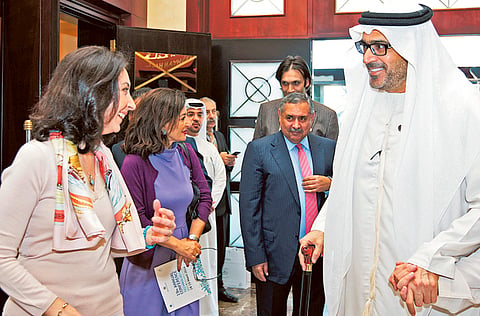Use IT as a “main tool for globalisation”
Internet holds an enormous potential for development — Princess Rym Ali

Dubai: Technological progress has led to qualitative leaps forward in all areas of life, accompanied by radical changes in thinking and it is the main tool for globalisation, said a top official at the 19th Annual Conference on the impacts, challenges and future of technology.
“We believe that a good planning will allow us to use the technology as a tool to achieve our aims and overcome the challenges that may be experienced by other societies,” said Dr Jamal Sanad Al Suwaidi, Director General of The Emirates Centre for Strategic Studies and Research (ECSSR), UAE, at the two-day event held in Abu Dhabi on the occasion of the 20th anniversary of the research centre.
He said all individuals, institutions and decision makers need to work closely to exchange their ideas in order to reach a development plan that can maximise the use of human resources and technological advancements in the best possible manner.
Princess Rym Ali, Founder of Jordan Media Institute, said in the key note speech that internet holds an enormous potential for development and today, everything we do is on the internet.
“Some countries are in the middle of the phase with increased government controls while others are struggling to preserve the values of the UN-approved communication channel,” she said.
Professor Linnar Viik, Former Director of Skype Technologies Ltd and Associate Professor and Member of the Board, Estonian Information Technology College, Estonia, said that innovation can emerge from new technologies and non-technological knowledge.
He said that non-technological innovations are closely related to the knowhow, skills and working conditions that are embedded in organisations.
Although substantial gains can be obtained by improving institutions, building infrastructure, reducing macroeconomic instability, or improving human capital, all these factors eventually run into “diminishing returns.”
“We have reached a point in the development of information technology where our perspectives of our current position and our future prospects are both too small and too large. We have a right to be interested in both aspects of the technology because our current position should tell us whether we are using the technology profitably and our vision of the future should help us prepare ourselves and our society for the next generation,” said Professor David Alan Grier, Associate Professor of International Science and Technology Policy and International Affairs, The George Washington University, US.
When looking to the future, he said that people are blinded by their own hope that this technology will make us wealthy and more powerful.
“We are eager for this technology to provide us with innovation. But the word innovation is not merely a synonym for invention but also involves a radical social change that cannot always be controlled,” he said.
The information technology has automated major tasks in all of the “seven classic categories” of social activity — production, commerce, finance, security, accounting, management and politics.
Grier said the tasks that remain are often more complex and engage social structures in more complicated ways.
Sign up for the Daily Briefing
Get the latest news and updates straight to your inbox



